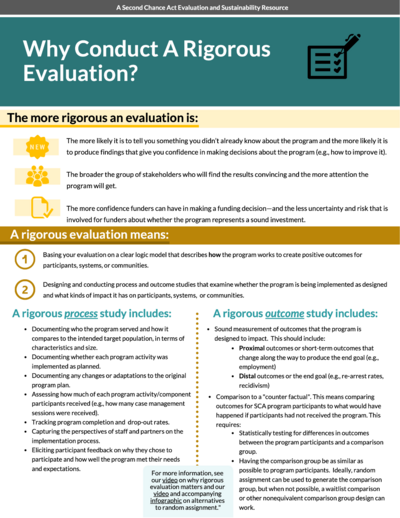- Home
- Multimedia
- Infographic Why Conduct Rigorous Evaluation
Infographic: Why Conduct a Rigorous Evaluation?
Infographic
Topics:
Evaluation and Sustainability
Second Chance Act
Reentry population:
Both Adults and Youth/Young Adults
Date:
Infographic: Why Conduct a Rigorous Evaluation?
A rigorous, well-executed evaluation allows funders to make confident programmatic and funding decisions. Therefore, when evaluating your reentry program, follow specific criteria to ensure that process and outcome studies are rigorous:
- Process evaluations should:
- Compare the program as delivered to the original program plan or logic model to identify departures from the model, including whom the program served, what activities took place, and what adaptations were made
- Assess dosage, program completion, and dropout rates
- Elicit participant and staff feedback
- Outcome evaluations need to:
- Identify an appropriate counterfactual that compares outcomes for program participants to outcomes for people like them who did not receive the program
- Examine whether the program works by comparing the treatment group to a relevant alternative group (often “business as usual”)
This infographic from the Evaluation and Sustainability Training and Technical Assistance (ES TTA) team at RTI International and the Center for Justice Innovation (formerly the Center for Court Innovation) provides an overview of the key components of a rigorous evaluation and why they matter.




